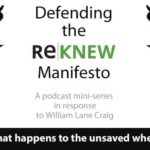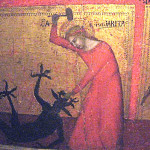We run our website the way we wished the whole internet worked: we provide high quality original content with no ads. We are funded solely by your direct support. Please consider supporting this project.
Is Hell Eternal Punishment?
The end of time, according to the Bible, is marked by hope, the hope that God’s will shall someday be done “on earth as it is in heaven.” The hope is that however terrible our present circumstances may be, before long they will all come to an end. Then creation will be what God always intended it to be.
However, Scripture’s otherwise magnificent vision of the end seems to be marred by one thing. According to traditional interpretations, this vision includes the understanding that innumerable angels and people will suffer excruciating pain for all eternity. Rebels will anguish in a lake of fie that will never be extinguished (Lk 16:22-24; Rev 14:10; 20:14-15) and in which they “will be tormented day and night, forever and ever” (Rev 20:10).
How are we consistently to conceive of a God who loves and died for every human who ever existed preserving their existence forever for no other purpose than perpetual torment? Further, how are we to understand the redeemed enjoying untainted bliss in heaven if alongside of this kingdom billions of people and fallen angels will be experiencing excruciating, unending anguish?
The problem is exceedingly difficult and extremely important. The traditional view that hell is eternal, conscious suffering is by far the most predominant view. However an increasing number of theologians and biblical scholars reject the traditional premise that the Bible teaches that those who reject God suffer eternally. They rather argue that Scripture teaches that those who reject God are ultimately annihilated.
In response to traditional interpretations, annihilationists maintain that the passages used to support the doctrine of eternal hell do not teach that hell is suffered eternally, only that its consequences are eternal. The damned suffer “eternal punishment” (Mt 25:46), “eternal judgment” (Heb 6:2) and “eternal destruction” (2 Thes 1:9) the same way the elect experience “eternal redemption” (Heb 9:12, cf 5:9). The elect do not undergo an eternal process of redemption. Their redemption is eternal in the sense that once the elect are redeemed, it is forever. Likewise, annihilationists teach, the damned do not undergo an eternal process of punishment or destruction, but once they are punished or destroyed, it is forever.
Annihilationists argue that Scripture’s references to an “unquenchable fire” and “undying worm” also refer to the finality of judgment, not its duration. The fire is unquenchable in the sense that one cannot hope to put it out before it consumes those thrown into it. Similarly, the worm is undying in the sense that there is no hope that it will be prevented from devouring the corpses of the condemned. Nevertheless, most annihilationists hold that there is a period of suffering for the damned prior to their annihilation, depending on the severity of their wickedness. In their minds, this accounts for passages noted above that seem to ascribe conscious suffering to those who are judged.
Finally, concerning the passages in Revelation that speak of torment being “day and night forever and ever,” annihilationists point out that this is a symbolic book whose apocalyptic images should not be taken literally. Indeed, even in the book of Isaiah, which is generally far less symbolic than Revelation, God’s judgment could be described in everlasting terms in a context where it could not possible be taken literally. Isaiah writes that the fire that will consume Edom will burn “night and day” and “shall not be quenched.” Its smoke “shall go up forever” and no one will pass through this land again “forever and ever” (Is 34:10). Obviously, this is hyperbolic, for the fire and smoke of Edom’s judgment is not still ascending today. If this is true of Isaiah, annihilationists argue, how much less inclined should we be to interpret similar expressions literally in the book of Revelation?
—Adapted from Satan and the Problem of Evil, pages 320-321, 327-329.
Category: Q&A
Tags: Annihilationism, Hell, Revelation, Warfare Worldview
Topics: End Times
Related Reading

Podcast: Defending the Manifesto (9 of 10 )
Greg responds to challenges by William Lane Craig from Craig’s podcast “Reasonable Faith.“ Greg discusses annihilationism. http://traffic.libsyn.com/askgregboyd/Episode_0064.mp3

The Universal Experience of the “Spiritual”
Humans have from prehistoric times generally assumed the reality of spirits who transcend our physical existence. Outside of post-Enlightenment western intellectual culture the belief in spirits is almost universal. Whether conceptualized as spirits of nature or as power animals (as in primordial cultures), as helpful malã’ika or malicious Jinn (Islam) or as guardian angels or…

That Weird Episode with the Pigs
In my opinion, the single strangest episode recounted in the Gospels is the account of Jesus’ encounter with a demonized man that ended with two thousand pigs drowning themselves in the Sea of Galilee (Mk 5:1-10//Mt 8:28-34; Lk 8:26-39). Some find it morally objectionable that this mass suicide was the result of Jesus allowing the…

Resignation to Evil: Not an Option
One lucky guy via Compfight While few Christians would deny that Satan is in some sense the ruler of this world, since it’s so clearly taught in the New Testament, many nevertheless insist that everything Satan and every other free agent does fits into a divine plan that is governing every detail of world history.…

Old Testament Support for the Warfare Worldview
Rebuking Hostile Waters Satan plays a minor role in the Old Testament relative to the New Testament. Instead, the warfare worldview in the Old Testament is expressed in terms of God’s conflict with hostile waters, cosmic monsters, and other gods.Like their Ancient Near Eastern neighbors, ancient Jews believed that the earth was founded upon and…

Warfare Worldview: A Basic Definition
The warfare worldview is based on the conviction that our world is engaged in a cosmic war between a myriad of agents, both human and angelic, that have aligned themselves with either God or Satan. We believe this worldview best reflects the response to evil depicted throughout the Bible. For example, Jesus unequivocally opposed evils…
